#soundtracks are my one thing
Explore tagged Tumblr posts
Text





Sneakily posting more of my little guys....they should put me in charge of a dlc i would do normal things pls pls pls
#rain world#five pebbles#looks to the moon#rain world oc#iterator oc#aannndd my lil ancient guy :)))#anyhow guys this is totally not be looking throuhg old drafts just so i have something to post i dont do that ever#<< actually dosent i have so many unposted things.#anyhow its lp my guy and pop again!!! holy shit!!!!#and a uh ms paint challange at the top from ages ago#and you know i was planning on making a proper ancient lore talk post but i got hit by reality. like in the song. so i havent had the time#but one day for suuureeeeee#also yes this is totally a smokescreen to distracct you gys from the fact i also posted some other art dont mind me for real#yippe posting stuff i love posting anyhow!#we are listning to the kingdom two crowns soundtrack again because its so so good#anyhow goodnight!#:D#my art
421 notes
·
View notes
Text
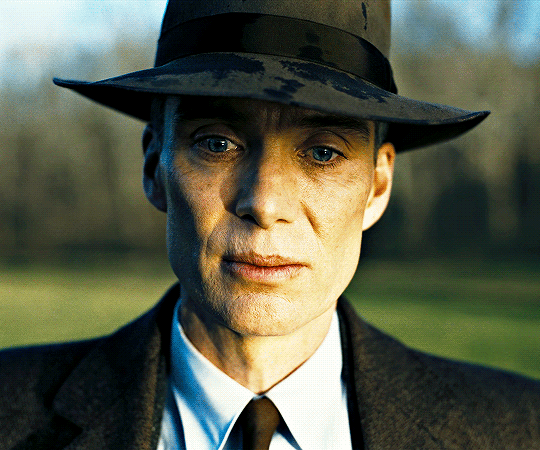


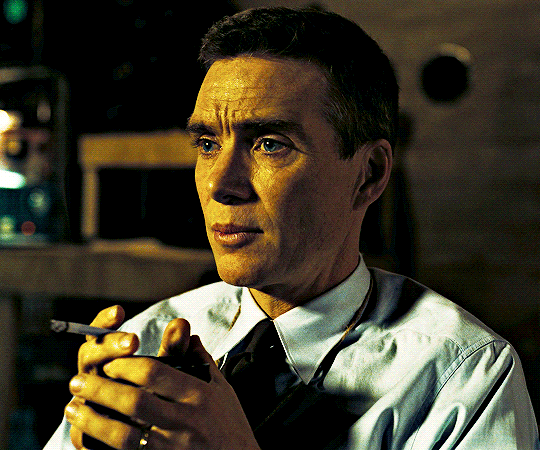
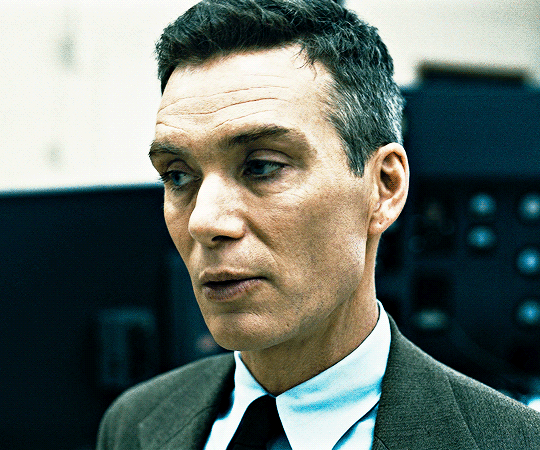

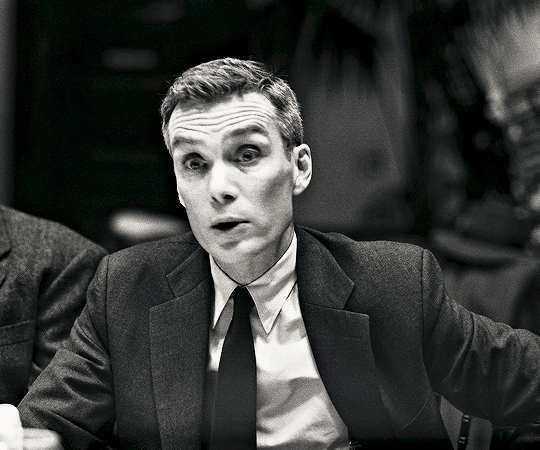
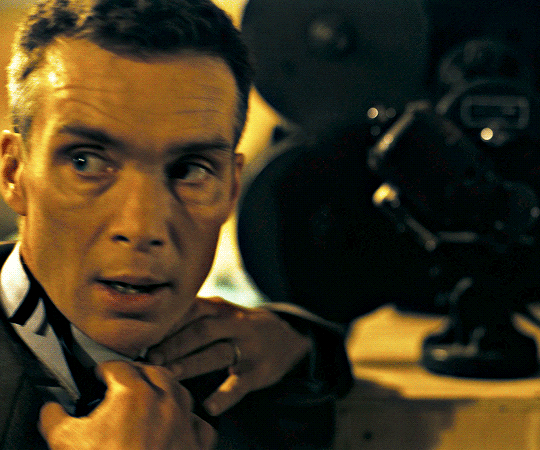


Prometheus stole fire from the gods and gave it to man. For this he was chained to a rock and tortured for eternity. Oppenheimer (2023) dir. Christopher Nolan
#oppenheimer#filmedit#cillian murphy#oppenheimeredit#henricavyll#usersilk#useranimusvox#jokerous#dailyflicks#barbenheimer#nikolatexla#this masterpiece was way beyond me. way beyond anyone else#think of a movie that everything about it is perfect#the soundtrack. the actors. the script. the atmosphere.#i don't remember if i ever watched a scene before where my heartbeat was that fast#there were more than 100 people inside and no one made the slightest sound and it was like i could hear every heartbeat#this was my first nolan movie. i couldn't go tenet (which was amazing too) but i'm glad i didn't bc this was the best one#mind you the only thing i understood at first sight was a scene about black holes in which i was genuinely interested before#you know the movie becomes way more fun when you actually understand it - not as a whole but also the details
2K notes
·
View notes
Text
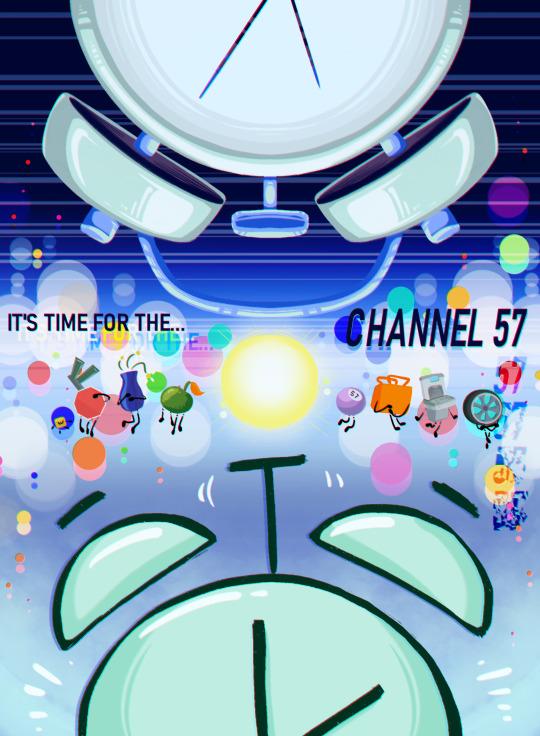
And On Next.... The Weather!
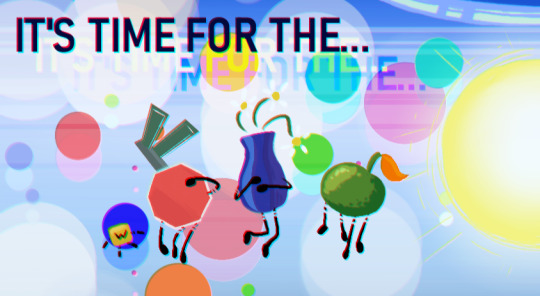
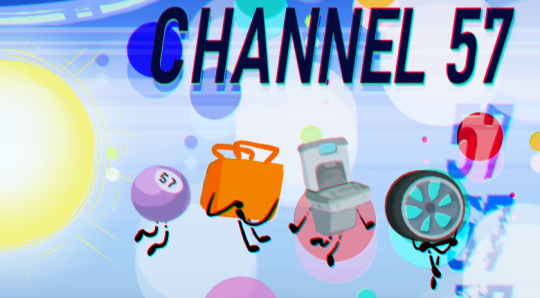
doubt any of you woulda expected this one did ya!
#it's time for the#itft#itft clock#itft fanart#osc art#expect more from me obsessing over object shows. I feel like im back in 2016/17 again and im having the best time of my life#shocked this was the one i did first but the vibes of this show have realllllly stuck with me and i was listening to the soundtrack playlis#so i kinda had to make someeethhiiinnggg#also as a celebratory thing for the next episode release!!! heheh!!!#expect something with maybeeee burner or animatic battle next. perhaps#itft spoilers#<- technically i guess? i mean it's vague and like I don't actually know what that lore is in the show like at all so#just to be safe really...#KD'Crumbs#TheTrinketShelf!
189 notes
·
View notes
Text
I’m not super far into the game yet but DAYUMMMM THE MUSIC THO?? They’ve EXTRA remastered it. REMIXED it even. Also I noticed that they’ve made new tracks for mood changes too, and gave some characters some new themes :’D I really like those little additions in the soundtrack, definitely makes the game feel more modern for sure
Also I laughed my ass off at the Goomba face off bc they censored the FUCK out of it. And for good reason too I mean the original is, um, well,
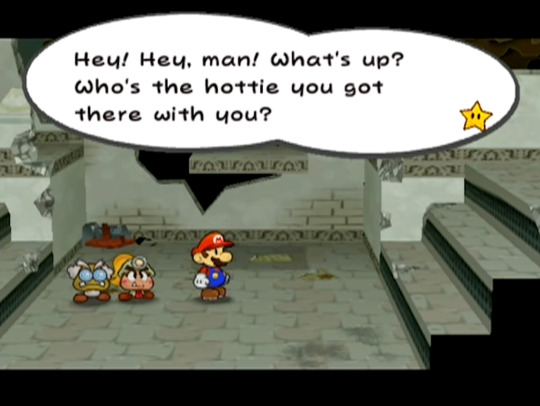
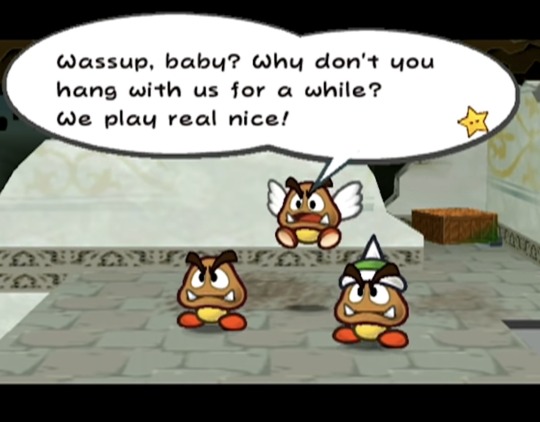
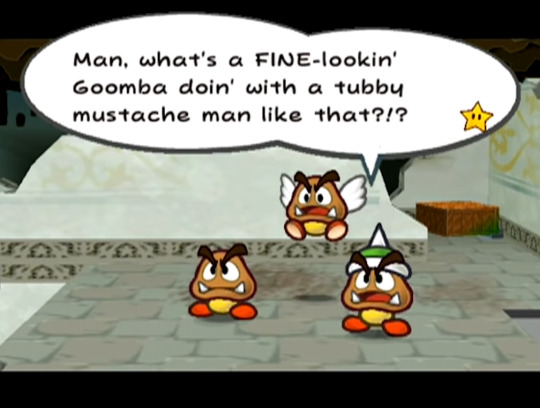
I guess catcalling isn’t age appropriate LMAOOOO
#Shima speaks#Paper Mario#Paper Mario TTYD#Mario#Paper Mario The Thousand Year Door#Not sure how I feel about some of the soundtrack remasters but.#They DO sound really good#I just have my nostalgia lenses on sorry 🤭#Anyway I love that like. The elder in Petalburg has his own theme now! And Frankly got a soundtrack change during a ‘serious moment’ too#It’s the little things 🥰#One thing I DO miss tho is the clapping at the end of each battle…where is my audience applause…
248 notes
·
View notes
Text
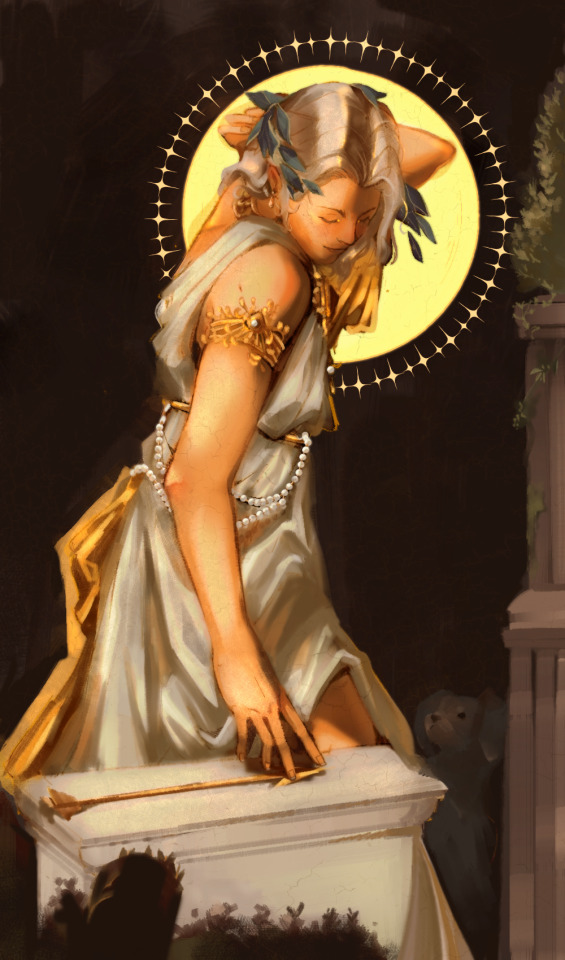


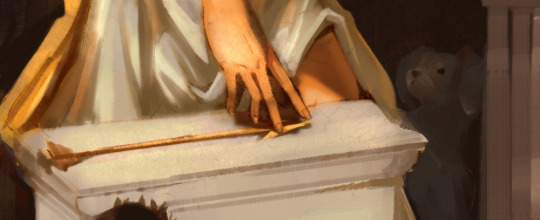
get Apollo'd idiot @sheerunfilteredhubris
#[.art]#^ if the didascalia is unclear this is meant to be a portrait of sorts. Of my friend. Technically of the greek god too but same thing#Juno#<- goes in my tags soley in this way I don't have a clue of what else to put on here#with added closeups! This took me one afternoon and some. I think about four hours in total if I add up all the last-minute editing#it was going to have a more complex background but it ruined the constrast and the shapes got lost in it so I had to scrap that#alas I don't think this will work as a way to achieve endless youth but we can't /all/ turn art into devil deals#no I'm not going to stop making that joke. I think it's hilarious.#also my soundtrack for this was the Hozier youtube automated playlist. we are not escaping with our lives I fear /j#is it neoclassical or more baroque? The main inspiration was the first but the harsher contrast reminds me of the second#ah well. You can tell me that. I can't analyse my own art#my art#greek mythology#classical mythology#painting#apollo#<- i'm putting these tags back here so it doesn't show up in the search it's just for my blog organisation
324 notes
·
View notes
Text
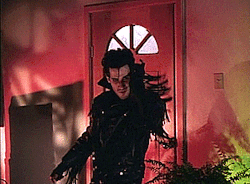


"I just wanna make sweet love to you~"
I'm just saying Russ would have treated Audrey much better than Orin did and showed him how to be a real rockabilly greaser. No, I will not take constructive criticism.
#i was listening to the LSOH soundtrack and this ship popped into my head#one thing led to another and now i think i have my first real Crossover ship#Little Shop of Horrors#the slumber party massacre#Driller Killer#Audrey#orin scrivello#Audrey x Russ#hmmm.... Rock n Flora? for the ship name?#im too far gone already guys you cant stop me-#ships#horror movies#slashers
122 notes
·
View notes
Text

((( WIP )))
I made an AU for CotL because of a song I love that I heavily related to Narinder ,,,,,,, it’s called Cult of the Band and it’s a battle of the bands sorta thing !! Idk if it’ll have magic but ngl I’m really leaning towards having it 👀👀👀 anyway I’ll post more about it laterrrr
#and thanks to my best friend for listening to me talk about this idea for. hours I think#they were really into it too tho so I think it’s cool#also I’ve been obsessively listening to the cotl soundtrack#man it’s divine#pun intended#and the one thing I know FOR SURE !!! is that Leshy is a guitarist#the rest ? you shall see#me too apparently#anywaysies#cult of the band AU#cotl au#cult of the lamb#cotl#illustration#my art#artists on tumblr#art
47 notes
·
View notes
Text
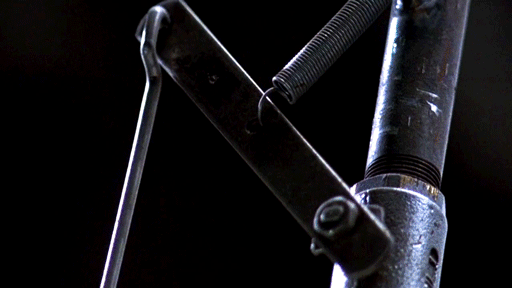

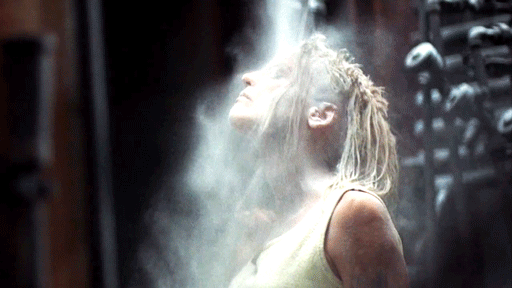
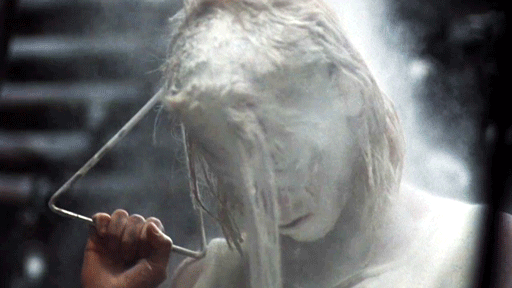
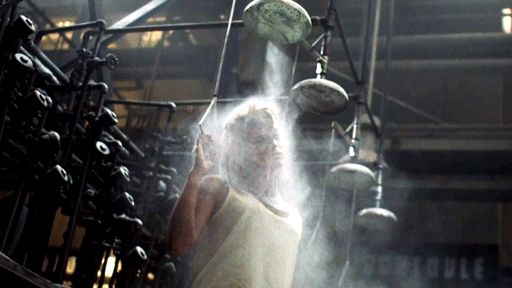
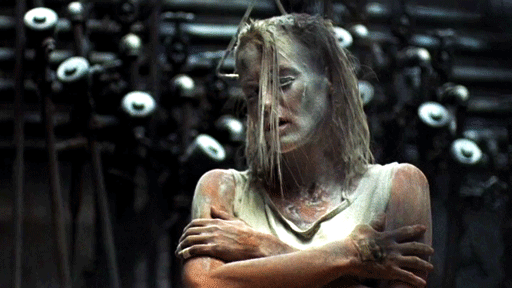
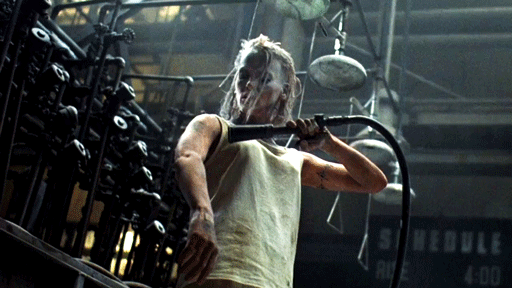
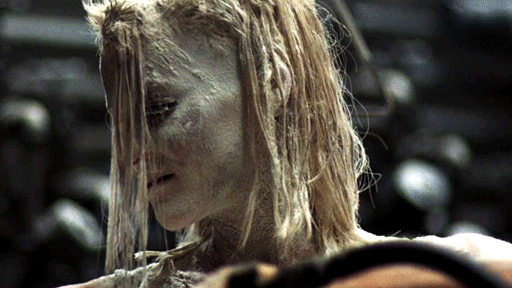
Tank Girl (1995)
#i'll gif the whole movie eventually but i was just thinking abt this scene#this movie got a lot of things wrong but the soundtrack was not one of them#tank girl#lori petty#my gifs
104 notes
·
View notes
Text

There's a rider on the road / There's calamity a-waiting to unfold / There is poison in the well / There's the augur of a distant ringing bell / It says: hold, hold, hold your ground...
my half of that art trade with the wonderful @aranov! I've had an excellent time reading through the various adventures of Andrew O'Rourke — all the various permutations of his dynamic with Cordelia French and Dr. Jhandir delighted me so much that I couldn't finish this piece without drawing all three of them!
#em draws stuff#london-in-the-air#this got OUT OF HAND to a SEVERE DEGREE and I HAD SO MUCH FUN#the collage aesthetic of the older visuals from these stories are v fun so I've done my own take on that for this!#look. I had the excuse to play to Several of my strengths artistically and so I did.#six or seven layers of old print and engravings and a grungy scanner error page from the college newspaper archive#entire image was just piling more stuff into this canvas while laughing maniacally and kicking my feet#and also I think medical malpractice is one of the funnest things that a character can do so How could I leave jhandir out#you see.#caption lyrics from starwatcher decemberists even though this process was entirely soundtracked by the dreadnoughts. so ends.
21 notes
·
View notes
Text
once again I am outsourcing my decision making
#Emma 2009 my BELOVED (the opening music SLAPS I am gonna CRY) however I just watched it for the nth time a few months ago? but apparently#still want to rewatch enough that I'm currently listening to the soundtrack and experiencing waves of nostalgia#the thing about tv shows which aren't miniseries is they take me for. ever. to finish them#so I always hesitate when committing to a new show#also I can handle one at a time which is why d20 shows get treated like tv shows despite being slightly different in actuality#emma 2009#poll
21 notes
·
View notes
Text
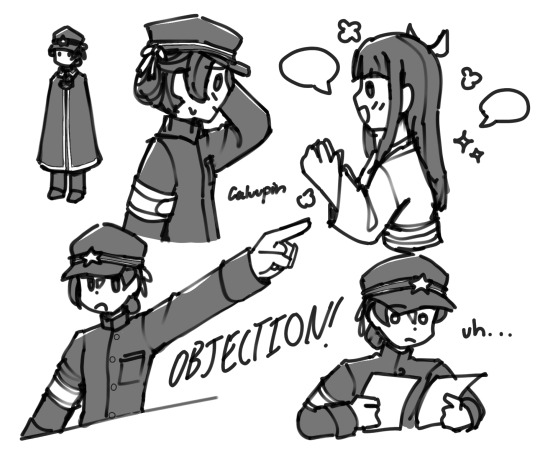
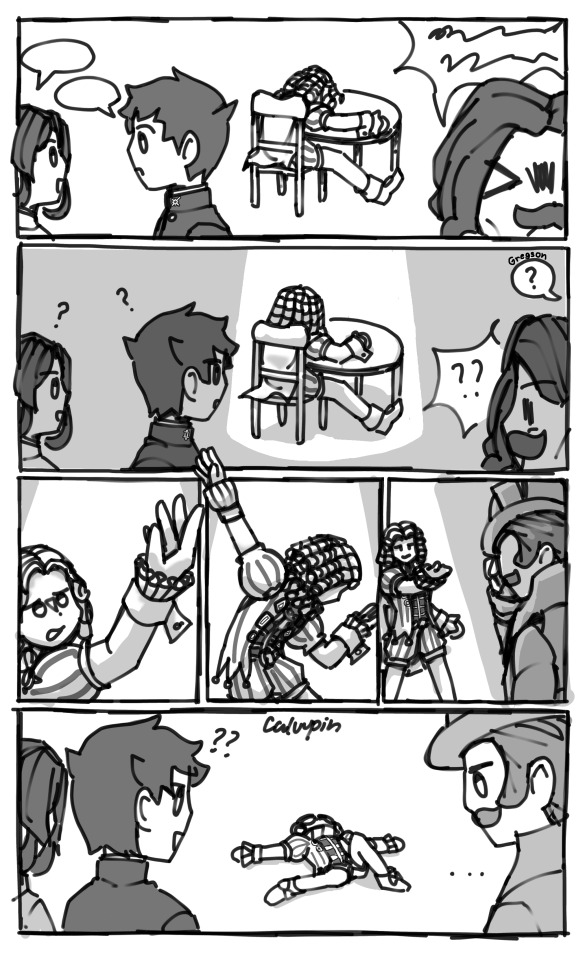

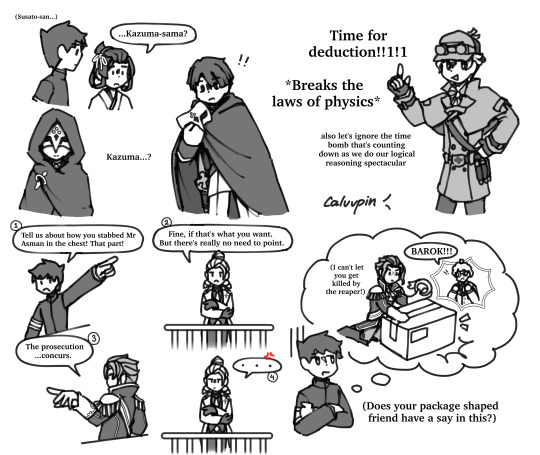
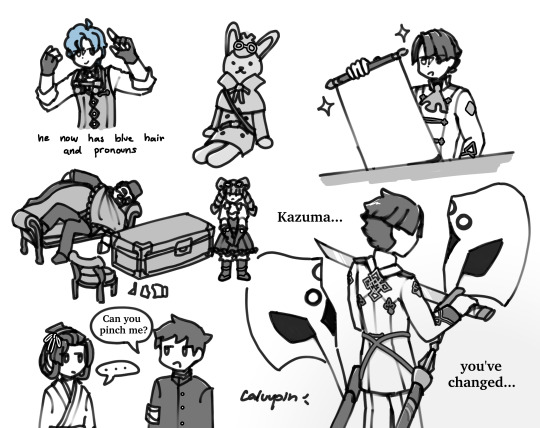

Finished TGAAC around 2 1/2 weeks ago but only finished the doodles today. but still, here ya go!
#caluuart#art#dgs spoilers#dgs2 spoilers#tgaa spoilers#tgaa2 spoilers#ace attorney#the great ace attorney#tgaa#dgs2#not tagging characters bc it's a lot#RAMBLE TIME. so ever since I finished dgs2 I have been listening to the soundtracks and MAN these bang so much#esp as a person who plays the piano and likes music. it's just. good. yeah. some of these do give me psychological dmg tho lmaoo#like kazuma's nocturne theme or his prosecutor theme. or the secret trial theme.... the partners - the game is afoot! theme.... I am normal#WHICH SPEAKING OF! man I love the sholmes + mikotoba partner twist so much even if i got a bit spoiled about it. i just think they're neat.#The partners of all time I think.#Also also the found family!?!?!? I am A SUCKER for found family. they fed me so well.#funny thing was the barok character development surprised me despite the fact that I also expected it since the first game lolol.#I do think he's an interesting character and probably one of the best character development in the game. And that I find his design cool.#oh yeah I didn't draw it but when I saw that albert mentioned that barok is “the darling of the van zieks family” I was genuinely like.#huh? wdym. like man at the time “van zieks” and “little darling” feels wrong in the same sentence. that was until I saw his pre-#-trauma pictures n well. albert isn't wrong. which was a slight surprise to me.#In conclusion: I liked it a lot. and now occupies parts of my brain along with my other brainrots.#They fight for priority in my brain whenever I try to sleep or disassociate lol. Well at least there's more material to think about.#off topic time: arlecchino animation. for the sake of the tag's length I'll just say a few things:#I am very very interested in her story and oh my god father.#My brain has stopped braining now; good night my fellows
81 notes
·
View notes
Text
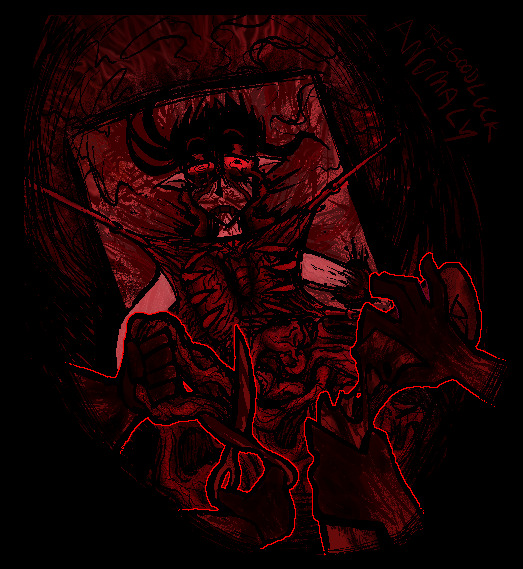
[PUT INTO PLACE, TIED DOWN AND ARRANGED, AND IS NEVER THE SAME, AGAIN.]<-listen to my favorite songs. VAMPIRES ARE WONDERFUL ARENT THEY. THE FLESH IS SO MUCH MORE DURABLE. SO MUCH STRETCHIER THAN HUMANS. THE STRESS DOESNT KILL A VAMPIRE THE SAME WAY IT DOES A HUMAN. YOU CAN TAKE THEM APART THREAD BY THREAD AND LEAVE THEM WIDE AWAKE WITHOUT WORRY OF THE BRAINMATTER SPOILING UNDER VINEGARY AGONY.
#cw gore#WEEEE WHIPPING OUT ALL MY BELOVED PIXEL HORROR GAME SOUNDTRACKS FOR THIS ONE#STILL A WIP#SORTA. FORKSFORKSFORKS INSPIRED ME TO START WORKIN AT IT AGAIN. AND NOW IT LIVES. IT LIIIVEESS!!!#MOSLT.Y ATLEAST. I MIGHT MESS W IT MORE LATER. WE SHALL SEE. ANYWAY GABRIEL MONTEZ HUH. WOW POOR GUY#THERES A FASCINATING FEELING THAT COMES WITH BEING ON A OPERATING TABLE.AND BEING IN IMMENSE PAIN#ONE OF MY FONDEST MEMORIES IS LAYING ON A DENTIST CHAIR. SHAKING AND INVOLUNTARILY CRYING AFTER MANY MANY#NEEDLES TO MY THE MOUTH. I METABOLIZE THE NUMBING STUFF QUICKLY APPARENTLY. THEY NEEDED ALOT OF NUMBING SHOTS#BUT I WASNT AFRAID OR DISTRESSED. THE DENTIST WAS VERYVERY NICE AND ALSO UH. PRETTY. BUT THATS BESIDE THE POINT#THE POINT IS. THAT IT WAS FASCINATING TO REALIZE MY PHYSICAL RESPONSE TO PAIN UNDER A CONTROLLED ENVIRONMENT#I DIDNT KNOW HOW EASY IT WAS TO SHAKE AND TO CRY PRYVIOUS TO THAT EXPERIENCE.MY DENTAL ADVENTURES CONTINUE#THEY CONTINUE TO HELP ME UNDERSTAND WHAT ITS LIKE FOR PAIN TO BOIL AWAY THE TIME. TO DISTORT THE PASSING HOURS AND CONSUME EVERY THOUGHT#DO YOU REMEMBER PAIN? THE MOST SEVERE PAIN IN YOUR LIFE? NOW WILL YOU IMAGINE RED LIGHTS? RED LIGHTS AND SHIFTING FIGURES#NOW WILL YOU IMAGINE PAIN UNRELENTING.PAIN WORLD SHATTERING.PAIN IMMORTAL.CAN YOU IMAGINE BEING PULLED APART#THE HUMAN MIND CAN ONLY WITHSTAND SO MUCH PAIN BEFORE IT SHUTS DOWN AND HIDES.IT NEEDS TO PROTECT ITSELF AFTERALL. PAIN CAN ALTER#PAIN SHIFTS THE CHEMISTY OF THE MIND OF THE FLESH OF THE SOUL. FOR HUMANS ATLEAST. BUT YOU ARE NO LONGER HUMAN#YOU CHOSE OTHERWISE DIDNT YOU BOY.BECAUSE YOU WANTED MORE.STATUS.POWER.APPROVAL.SECURITY.SAFET.Y.#OHHH YOU CAN WITHSTAND THE PAIN FOR THAT. FOR ALL THAT. YOU WERENT TOLD THERE WOULD BE PAIN BUT YOU KNOW WHAT YOU WERE PROMISED.#ITS ALL WORTH IT IN THE END. NOW LETS JUST HOPE SOME BLONDE TWERP DOESNT PROVE TO BE STRONGER THAN THE STRONGEST PEOPLE IN YOUR LIFE#LETS HOPE NO ONE FUCKS THIS UP. LETS HOPE NO ONE FUCKS THIS UP. I LOST MY TRAIN O THOUGHT#anyway dawww poorr gabeee that shit probably huuurrrrtttss but so much time has passed that your body got tired of screaming and squirming#why havnt you passed out yet? maybe you might as well have at this point. like sleeping with your eyes open and your nerves awake#OH HEY FUNFACT ABT THE ART. I FOUGHT W IT ALOT. TOOK A LONG WHILE FOR ME TO BE REMOTELY HAPPY W THIS.#i was thinking abt pixel horror video games when i made it.just as i do with all great things ofc ofc#i love you pixel horror game i love yooouuuuu.i struggled so much w the colors for so LONNGG UHGHGHGH but im finally happy...im finally fre
62 notes
·
View notes
Note
if you're open to angsty prompts - tgm mission goes bad and Ice gets to accept Bradley and Mav's flags at their funerals? (but only if you're feeling angsty. if not, feel free to ignore!)
San Diego, California. November 2016.
It should not be surprising that the complicated politics of a funeral like Mitchell’s supersede even the national grief of losing him, but of course it is. The Defense Department and the new administration (loudly Tweeting out of their asses because the President-Elect hasn’t yet been sworn in) want to hold it in Arlington. Do it in D.C., show American unity, show how proud we are of our fallen aviator, who sacrificed himself for America’s national interests, bury him in Virginian soil next to Kennedy’s eternal flame… It’s not a terrible idea, geopolitically speaking. But the Republican leadership of the state of Texas wants a piece of him, too. Why not bury him in the National Cemetery in Dallas? That’s where he’s from. Lay him to rest in the soil of his forefathers, as all good men should be. But the entire Pacific Fleet of the United States Navy, it is argued by people who aren’t Kazansky, also has a stake in this. Bury him at sea. He gave his life for the Navy. This is how it ought to be. Bury both Mitchell and Bradshaw at sea the way we buried other American Navy heroes like John Paul Jones. (When he hears this argument, Kazansky also remembers that we buried Osama bin Laden at sea, too.)
The whole political clusterfuck is put to rest at last in mid-November, when someone bothers to ask Kazansky what he thinks, and Kazansky says, “I’ll remind you that there’s absolutely nothing left of him to bury. But Mitchell lived in California for the last thirty years of his life. He told me he’d want to be buried in San Diego. I don’t really care where you put him. But that’s what he said he wanted.” And after Pacific Command leadership hears this and communicates it to the White House, everyone all of a sudden bends over backwards to organize a joint funeral in San Diego, where Bradshaw’s parents are buried, anyway. Maybe it really is fitting. Okay.
It’s a funny thing, ritual. The military’s full of it. A funeral: that’s a ritual. So, too, is promotion, retirement, commissioning in the first place. So, too, is the everyday ritual of getting dressed, donning battle gear, which today is dress blues, the way it was the day Mitchell died. Medals instead of ribbons. The President posthumously gave Bradshaw and Mitchell Medals of Honor. Their bodies would be wearing them, if there were bodies to bury. The President prehumously gave Kazansky and Seresin Medals of Honor as well. Kazansky’s is sitting around his throat like a noose. He feels like nothing but a body himself, no soul, already passed-on. They’ll lower Mitchell’s empty casket into the ground this afternoon and Kazansky’s already thinking about climbing inside it before they do. He’s not so un-self-aware that he can’t see the absurdity in that thought. But he’s also not so self-aware that he isn’t having that thought.
It’s the highest-profile funeral Kazansky’s attended in a few years. The Secretary of State is here. The Secretary of Defense is here. The Secretary of the Navy is here. The Vice President is here. He, too, has only recently lost a son; he, too, has already lost someone he thought he’d spend the rest of his life with. They don’t talk, but when they shake hands, it feels like stronger solidarity than all the Sorry for your losses Kazansky’s received over the past couple weeks. Everyone here knows about him and Mitchell, in a way that had once been Kazansky’s worst nightmare; now, his actual worst nightmare having been realized, he can’t bring himself to care, and no one’s making a big deal out of it. When they say, Sorry for your loss, they don’t mean in the “loss of two highly strategic assets for the U.S. Pacific Fleet” sense, they mean in the “loss of the only two people you cared about more than your career” sense. Sorry for your loss. It’s not so bad. And because everyone knows, in a way that had once been Kazansky’s worst nightmare, no one bats an eye when Kazansky realizes his actual worst nightmare and accepts Mitchell’s folded flag. No, they weren’t legal family. But everyone knows they were close enough.
He tacks his own Naval aviator wings onto Mitchell’s empty casket. Twenty-one guns fire. He salutes. They lower two empty caskets into the ground and he’s still standing. It doesn’t really mean anything. It’s not really a goodbye, because neither Mitchell nor Bradshaw are actually inside. He watches Seresin struggle not to cry. He stands before a few hundred people and makes a short boring speech about service and sacrifice that he did not write. This is all political. This is all just for show. Most ritual usually is. So who gives a fuck.
He disappears before anyone can pin him down to apologize again and again, but finds that his intended hideout location has already been claimed: by the time he makes it to Goose’s grave, Seresin’s already standing there alone, his hands in his blues pockets, his cap tucked under his arm.
“I just,” says Seresin stupidly. His eyes are red-rimmed and his face is sallow. They’ve never really spoken, the two of them, but Kazansky’s heard the rumors about him and Bradshaw. And he’s sure Seresin’s heard the rumors about him and Mitchell. They’re in the same leaking boat, here. “Bradley talked about him all the time.” Gestures down to the grave. “And about you. And about Maverick.”
Kazansky says, “Would you want to have lunch with me? I’m not very hungry. But maybe we can talk.” He’s trying. Too little too late, but he’s trying.
He exchanges his jingling blues coat for a regular suit jacket in the armored Suburban. Takes the Medal of Honor off as he does. Seresin, still only a lieutenant, doesn’t have the luxury of a general staff who will carry around a wardrobe change on his behalf. He’s gonna have to make do with his dress blues. He’s nervously fingering the Medal of Honor around his neck, and will continue to do so long after they’ve taken their seats in a restaurant downtown where Kazansky used to take Mitchell out for dinner, not so long ago. He can hear his chief flag aide kindly whispering to their waiter: Somewhere in the back. Where they won’t be bothered. Everyone’s being so kind.
“I could kill him,” Seresin says after a few minutes.
“Who?” says Kazansky incuriously. He’s been running his fingers over the condensation on his water glass. Now his fingertips are wet. Actions and consequences.
“Cyclone. He’s the one who refused to send me. And he didn’t launch search-and-rescue, either.”
Kazansky blinks, then looks down at his menu. “No, son, that was me.”
Seresin’s Then I could kill you goes unsaid. It’s quiet for a long time, long enough that Kazansky’s read through the menu—every word—twice. Then Seresin says, “Why?”
“You would’ve searched for the rest of your life and rescued nothing, and blamed yourself.”
“I blame myself for not going anyway. For not disobeying orders. —Maverick would’ve gone.”
Yeah, he probably would have. Kazansky remembers, in a split second, a story Mitchell had only told him a few years ago, lying next to him in the dark, a little tipsy after dinner and touchy-feely as he always was lying next to Kazansky in the dark: I don’t think I ever told you the story of how I saved Cougar’s life. His warm hands, gentle and unhurried, sliding up and down Kazansky’s abdomen: it’s so funny the details you choose to overlook at the time, and only remember when you lose them. / Well, I never wanted to ask. You hate telling those stories, I thought, Kazansky had said. Because it was true. At any party, Mitchell could tell the stories of how he saved Cougar’s life and how he ejected out of a flat spin at TOPGUN and how he shot down three MiGs not two weeks later—but he’d always have nightmares about all of it the night after. He hated telling those stories. He’d only do it if people asked, so Kazansky never asked. / You’re here in bed next to me, Mitchell said, so I’ll sleep just fine. Let me be a hero for you for once. —It was the day I saw that first Soviet MiG up close. Remember that? Negative four-G inverted dive? That was real, baby. Scared the shit outta Cougar. Messed him up bad. I mean, he thought we were all cooked. He wasn’t gonna land, I mean. Or if he tried, he was gonna plow right into the side of the boat. Couldn’t see straight. You ever been so scared you couldn’t see straight? He was dipping his wings, power too low, basically drunk-driving his Tomcat, I mean, it was freaky. So I touch-and-goed my F-14. / Against orders, surely, Kazansky’d said. / Oh, of course. You’ve met me, haven’t you? Of course, against orders. We were both outta gas. But I took off again and circled around to find him, and guided him in, you know, level off, call the ball, there you go, Coug, you got it, you got it. Don’t know if he ever told you this—he probably did ten million dollars of damage to that plane. Fucked up the landing gear and snapped off his tailhook and ground up into the fuselage. / But he lived. / But he lived, Mitchell said, and that’s how I got sent to TOPGUN. And that’s—with a soft sweet kiss—how I met you. / My hero, Kazansky’d said.
“Yeah,” he says noncommittally. “Maverick would’ve gone. —But he’d have searched for the rest of his life and rescued nothing, and blamed himself.”
Seresin says, “Is that what happened with him and Bradley’s dad? Is that what happened with Goose?”
“Yeah.”
They sit in silence for another while. The waiter comes by to take their orders. Kazansky’s not hungry and orders a beer. Seresin’s starving and orders a burger and a side of onion rings and a glass of wine.
“Can I ask you a question?” Seresin says after another few minutes. “Are you, like, a coward, or something? —That speech you gave was pretty neutered, sir. You loved him and you can’t even say it at his funeral?”
It’s a stupid, immature question. The Navy doesn’t deserve to hear that out loud. Nor does Mitchell’s empty casket. Only Mitchell did, and too late now. Kazansky shrugs. “If I were a brave man,” he says, “do you think I would have let him go?”
“I’d like to think I’m a brave man,” says Seresin. “I let Bradley go because I trusted him to come back. —Honestly, I’m kind of fucking pissed about it, to be honest. Sorry for the language. But it’s the truth. The night after he died, I mean, I went apeshit. Tore up our photos, punched the wall, cried myself fucking dry, that kind of stupid shit. I was so mad. I trusted him to come back, and he didn’t. Thought he was a good pilot. —Sorry. Is that sacrilegious to say? We aren’t supposed to speak ill of the dead, are we? I don’t care. I’m still mad about it. I know I shouldn’t be. But it’s the only thing I know how to be, is angry. Does that make sense?”
“It makes sense.”
“Are you angry?”
“Yes, but not at Mitchell. You know that saying, we have old pilots and bold pilots, but never old, bold pilots? Maverick was an old, bold pilot. We both knew he was living on borrowed time. That’s how he lived.”
“Pretty fucking defeatist.”
Kazansky shrugs again. He is a man defeated.
Seresin says, “Are you gonna be okay?” Then, in the resulting silence, he says, “Sorry, stupid question. Sorry. It’s just—“ He hesitates. It’s only now that Kazansky sees the dark circles under his eyes, the tremor in his hands, the desperation in the stiffness of his shoulders. “Look, it’s just that I don’t think I’m going to be okay, and you’re a lot older than me, and I keep thinking you have, like, the answer. Some wisdom, you know what I mean? How am I gonna be okay? You’re the Commander of the Pacific Fleet of the United States Navy. Aren’t you supposed to know what to do? Aren’t you supposed to give me orders? What do I do?”
“If I were a wise man,” Kazansky says, “do you think I would have let him go?”
Seresin is quiet. His food comes. He immediately launches into it, eats ravenously and silently for a few minutes.
Then he says, around a bite of his burger, “You know, I was gonna ask him to marry me.”
“Bradshaw?”
“Who else?”
Kazansky blinks. “I’m sorry for your loss.”
“Yeah,” says Seresin. “You know, fucking everyone is.”
“Lunch is on me,” Kazansky says.
Home, afterwards, is silent and lonely. Of course it is: Mitchell’s not here. Of course. Kazansky’s settling into it. Life so rarely gives you a choice, when assigning you ritual, routine. There’s still legal paperwork to fill out. That he can do. And there are still letters of condolences to respond to: Thank you for your kind words. Maverick was… figuring out how to end that sentence will give Kazansky a way to occupy his time for a while. And there are flowers to throw out—no one wants flowers after someone they care about has died. They stink up the house and permeate everything with their reminder of grief and mourning, and you’ll find the dried petals even months later and grieve and mourn all over again. Kazansky throws them all out before they can start shedding. There are friends to call and thank for coming. “I don’t know what to say,” Slider says over the phone. / “Yeah, neither do I,” says Kazansky, so they sit in silence on the line together for a while, and that’s pretty nice. / “He was the best of us,” says Sundown, and Kazansky thinks about what Seresin had said a few hours ago: Thought he was a good pilot. It’s a cruel thought, but sometimes the only thing you can be is angry: if Maverick really was the best of us, he should’ve come home. / “You know, I’m still in his debt,” says Cougar. “He saved my life thirty years ago. It’s so fucking stupid, you know what I mean, this idea that I should’ve saved his in return? Feels like it’s my fault that he died. Maybe I’m too superstitious. I’m indebted to a fucking dead man. I’ll never be able to pay him back. —Sorry, Ice. Sorry. I don’t mean to make it all about me. I can’t even imagine what you’re going through right now. I’m so sorry.”
“That’s okay,” says Kazansky. “Don’t, um—look, I’m just curious. How did he save your life? Would you mind telling me?”
“I don’t remember too much of it, to be honest,” says Cougar. “That’s why I quit, isn’t it? Something wrong with me. I was so scared I couldn’t see straight. You ever been so scared you couldn’t see straight? I wouldn’t have landed if it weren’t for Maverick. Or, if I had tried, I think I would’ve plowed into the side of the boat. Dipping my wings, power too low, basically drunk-driving my Tomcat. There was something wrong with me. You know, they could’ve kicked him out for that stunt, touch-and-going his F-14 like that. We were both outta gas. It could’ve killed him, too. But he guided me in. Saved my life. —I don’t think I ever told you this. I probably did about ten million dollars of damage to that plane. Fucked up my landing gear, snapped off my tailhook, ground up into the fuselage.”
“But you lived.”
“But I lived,” says Cougar. “And I came home to my family. Only ‘cause of him.”
“He was a hero.”
“He was a fucking hero,” says Cougar. “To the very fucking last. Sorry you had to go and fall in love with him. They advise against that, don’t they?”
“What, falling in love with heroes?”
“Yeah. —Sorry. Not funny.”
“A little funny. In a cosmic sense. Means it’s my own fault.”
Cougar pauses. “It wasn’t your fault, Ice.”
There’s still a Fleet to be run. Still work to be done. Kazansky can do that. People will laud him for the rest of his life for his professionalism under duress. He works when he should be grieving. Work is a ritual, too. Take some time off, sir, one of the Chief of Naval Operations’ aides had begged him. You need time. But he can’t. Only thing to do is keep working until all the work is done. The geopolitical situation after the mission, which was still classified as a success, is quite bad. They knew it would be. A bombing mission on Russian territory right near the American general election? Yeah, that’s bad. Russia’s Foreign Ministry has openly stated that if they find any remains of Mitchell and Bradshaw’s bodies, they will not extradite them home to the United States. I’m sorry you had to hear that, the President e-mailed him personally. But it’s fine. Kazansky likes the chaos. Means there’s work to do. He works.
When he can’t work anymore, because he’s done all the work that needs to be done, he takes care of another ritual. Life assigned him this one without giving him a choice, too. It’s past 2200. He turns no light on. He’s not sleeping in their bed, which is pretty cliché, and maybe he should be stronger than that, but you do have to make some concessions to your own grief when something like this happens. But he’s strong enough to sit on the side of it that had been his and open his phone and dial the number of his only favorited contact and hold the phone to his ear. It gives the dial tone five times, as is routine, and then Mitchell picks up the phone, as is routine. Hi! Captain Pete Mitchell here! Unfortunately I’m not able to come to the phone right now. Leave a message, or if it’s Navy business, you can shoot me an e-mail at C. A. P. T. dot P. dot Mitchell at navy dot mil. Thanks! Bye. Maybe Mitchell’s just busy. Maybe Mitchell’s somewhere without cell service. Maybe Mitchell’s just out flying.
Kazansky considers leaving a message, as is routine; realizes he doesn’t know what to say, as is routine; and hangs up, as is routine.
He takes all his medals off the rack of his double-breasted blues coat, packs them back into their clear-plastic-velvet boxes. He considers, momentarily, throwing out the Medal of Honor with the flowers. But he’s too self-aware to do that. He hangs up his coat on its felt-lined hanger, steams it straight, does the same to his slacks, slips the ensemble back into its garment bag, hangs it up next to Mitchell’s in their closet. This is a ritual, too. He takes a shower. He eats something. He answers a couple e-mails. He climbs into a bed that is not his own. He holds one of Mitchell’s college sweatshirts over his face and breathes in. He takes stock. His fuel gauge is reading pretty low. He knows his wings are dipping. If he really thought about it, he’d say he’s so scared he can’t see straight. And the truth is—he’s not so un-self-aware that he can’t recognize this, however numbly—Maverick’s not coming home to guide him in to land. Maverick’s never coming home again. Thought you were a good pilot. He closes his eyes. He tries to sleep.
#major character death#death#pete maverick mitchell#tom iceman kazansky#top gun maverick#top gun#icemav#top gun fanfiction#asks#sorry to start out my prompt fills with maybe the most soulcrushing thing ive ever written#ngl writing this yesterday fucked me up hard#sorry to sneak more pro-brandon propaganda in here but the parallel was too good to pass up#rip beau biden i guess#forgot to tag:#bradley rooster bradshaw#jake hangman seresin#hangster#soundtrack for this one is Judy collins’ send in the clowns
279 notes
·
View notes
Text
"Minkowski's been talking about Sondheim again…": Minkowski's love of musical theatre and what it reveals about her characterisation and her relationships
TL;DR: Renée Minkowski's love of musicals, while it might seem just like a mundane character detail, is used to give depth to her character because it contrasts with expectations of her from both the listening audience and the other characters. Her willingness or unwillingness to share this interest in different circumstances reveals her relationships with other characters at various points. Since this is a long one, if you'd rather read it as a document, you can view it here: Google Doc version.
"She actually really cares about these talent shows": Episode 8 (Box 953)
In the early episodes of Season 1, Minkowski is presented (largely through Eiffel's unreliable perspective) purely as a strict no-nonsense authority figure without much emotional depth, the kind of person who only likes things that are useful, purposeful, or mandated by Command. In contrast, musical theatre is a creative pursuit that has nothing to do with the mission of the Hephaestus and is viewed by many people as fairly frivolous or silly. The gradual exploration of Minkowski's passion for musicals is one of the many ways that the show expands and challenges our understanding of her as a character.
The first indication that we get of her interest in musicals is through her entry into the infamous talent show, something that is required as part of the mission. Minkowski really cares about 'crew morale' activities in general, even when they actually have a negative effect on morale and even before she's friends with any of her crew (for example, the Christmas and Thanksgiving dinners in the earlier stage of the mission), perhaps partly because doing things in the "right way" is important to her.
But Eiffel senses that the talent shows aren't just about rules for her: "it’s bad enough when she makes us do something just because it’s military protocol, but I think that she actually really cares about these talent shows". This might be the first indication that we get of Minkowski caring deeply about anything that isn't inherently part of her role as a Commander. Moments like this are part of the gradual process of giving us insight into her character beyond the Commander archetype that she tries to embody. And yet, she only indulges her theatrical passion because something mandatory gives her permission, or an excuse, to let another part of herself out.
Of course, to satisfy the needs of a talent show, she'd only need to provide a performance of a few minutes. But Eiffel mentions "the second act of the play" - which along with Hera's comment that "Isabel isn't the biggest role in the play" - implies that Minkowski was intending to put on the whole of Pirates of Penzance as her talent show act, rather than a few of the songs or some kind of medley. (I suppose that Eiffel could be exaggerating or Minkowski might have been planning to do extracts from different parts of the play, but I prefer the interpretation in which Minkowski gets to be more ridiculous.)
Even though no one else would be willing to be in her production of Pirates of Penzance, Minkowski casts Hera as Isabel, a role with two lines and no solo singing. I found some audition notes for this play which said "The traditional staging gives [Isabel] more prominence than the solo opportunities of the part suggest, so she must be a good actress" which does make me sad in relation to Hera's inability to have a more significant role by being physically present on stage.
It’s sweet that Hera still wants to take part though. She tells Eiffel "Pirates of Penzance is a classic of 19th century comic opera", so either she’s absorbed what Minkowski has told her about the show, or she’s done her own research and formed her own opinions. I enjoy the fact that Hera is the one Hephaestus crew member who shows potential to share Minkowski's musical theatre appreciation; I like to think that this is something they could explore together post-canon.
Anyway, I'm obsessed with the idea that Minkowski was planning to play every character except one in Pirates of Penzance, a show which is designed to have 10 principal characters and a chorus of 14 men. It seems that her contribution to the talent show was supposed to be an entire two-hour two-act musical, with costumes and props, in which she would play almost all of the parts. This is very funny to me as the perhaps predictable consequence of giving an ambitious and frustrated grown-up theatre kid a position of authority and asking them to arrange a talent show. Minkowski knows that the audience will be made up of her subordinates who are theoretically obliged by the chain of command to watch and listen, so she absolutely tries to make the most of that opportunity. There's probably also a degree to which she limits other people's involvement in her musical because - as with her other endeavors - she wants the outcome to be almost entirely within her control (something that is usually pretty much impossible in as collaborative a medium as musical theatre).
Of course, Minkowski's behaviour in most of the talent show episode is affected by her being drugged by Hilbert. This creates an exaggerated situation which is the first real opportunity for Minkowski to be something other than the strict sensible authoritarian Commander and the foil to Eiffel's jokey laid-back attitude. I don't agree with ideas that being intoxicated brings out anyone's true self (especially in the absence of consent for the intoxication), but it seems pretty clear that being under the influence of whatever was in Hilbert's concoction caused Minkowski to fully commit to a level of manic enthusiasm for her musical production that might have otherwise been obscured by her professionalism. It's a particular kind of person who belts showtunes when drunk, and Minkowski is that kind of person, even if that's not how she wants to present herself. (As a sidenote, I seem to remember that they took Emma Sherr-Ziarko's script off her to help her sound more drunk. It's an excellent performance.)
Minkowski wants interval ice cream. She wants "pirate costumes" (and she'll threaten to shoot a man to get them). She wants "swashes and buckles". She wants whatever props she can get her hands on (including a real cannon). This show is important to her, even though only three other people will witness it and two of them actively don't want to be there. It’s important to her for its own sake.
Eiffel says Minkowski wants "a second pair of eyes to tell her if the prop sabre for her Major-General costume was a bit much…" While I certainly wouldn't put it past Goddard Futuristics to have a prop sabre on the station for no apparent reason, it feels more likely that she might have made it or adapted some existing item. Which suggests that maybe she was that passionate about the props even before Hilbert drugged her.
Even so, it does feel significant that Minkowski's love of musicals is only revealed in the episode in which she is drugged, exhibiting lowered inhibitions, exaggerated behaviour, and an "impaired euphoric effect". Her love of musical theatre is initially revealed through a professional structure that provides permission, and then further emphasised by a forced intoxication that exaggerates some impulses that perhaps she already had.
"Some hobbies other than making trains run on time": Episode 17 (Bach to the Future)
After Eiffel tells to find Minkowski to find something else to do while her work duties have quietened down, they have the following exchange:
EIFFEL: You must have some hobbies other than making trains run on time. Something to do with friends? Boyfriends? MINKOWSKI: Of course I do, but, well, there aren't really a lot of opportunities for rock climbing or trail hiking in the immediate vicinity.
Even though this quote doesn't mention musicals, I've included it here for two reasons. Firstly, it's very funny to me that, even after the talent show debacle, Eiffel acts like he's never had any evidence of Minkowski's hobbies. She tried to perform a whole play almost single-handedly and it didn't occur to him that this might indicate an interest of hers outside of work. I think this reflects the fairly two-dimensional view that Eiffel has previously had of Minkowski, which her interest in musical theatre didn't fit into.
Secondly, it feels notable that Minkowski doesn't mention musical theatre here. She wants to show that she has non-work interests, but without undermining her own authoritative image. Her interest in rock climbing and trail hiking - while it may be genuine - fits with how she wants to be seen as a Commander. These are hobbies which portray her as physically capable, with a high degree of stamina and a willingness to adapt to perhaps less hospitable surroundings. Of course, Minkowski does have these traits and they serve her well on the Hephaestus. But there's not really anything particularly surprising about her expressing these interests. The surprise in this scene comes from the reveal that she has a husband, a character detail which - like her love of musicals - isn't something we'd necessarily expect from the archetype-based view of her we are initially presented with.
Her interest in rock climbing and trail hiking never come up again, because these details don't really deepen her characterisation (or at least, they aren't really used to deepen her characterisation beyond proving that she isn't entirely all-work-and-no-play). In contrast, Minkowski's love of musicals is brought up over and over because it shows another side of her that she struggles to reveal on the Hephaestus, and that allows more interesting things to be done with her characterisation.
"You wanted to write showtunes": Episode 35 (Need to Know)
Alongside the more high stakes discoveries prompted by the leak from Kepler's files, we also learn that Minkowski applied to - and was rejected from - the Tisch Graduate Musical Theater Writing Program.
Up until this point, we've only had evidence that Minkowski enjoys performing in musicals. But here we learn that Minkowski doesn't just love watching or performing in musicals - she wanted to write them too. This suggests a creative side to her that we never see her fully express.
The course
The Tisch Graduate Musical Theatre Writing Program claims to be the only course of its kind in the world and it accepts just 30 students each year. The current application process requires applicants to: upload play scripts or recordings of songs they've written; answer a large number of extended response questions about their creative process and views on musical theatre; write a 'statement of purpose' which has to talk about why they are applying and include 3 original ideas for musicals; provide a professional resume and a digital portfolio; complete an exercise of writing in response to a prompt; and undergo an interview. The process might have changed somewhat since Minkowski would have been applying (which, if it was soon after she finished college, might have been around the early 2000s) or it might be different in Wolf 359's alternate universe, but I think we can safely assume that applying to this course was a serious undertaking that required an intense amount of commitment and work.
Applying to a course like that isn't something you do half-heartedly or on a whim. You couldn't apply to this course if you hadn't done a fair amount of musical theatre writing already. (The course requires applicants to choose to apply as bookwriters, lyricists, or composers, but I'm not going to make a guess here as to which of these Minkowski went for.) The fact that Minkowski wanted to study this course suggests that she was seriously considering trying to make a career out of musical theatre writing. In Once In A Lifetime, she tells Cutter that commanding a space station has always been her dream job, but we've got evidence here that it wasn't her only dream job. There's something kind of funny and kind of sad about the idea that writing musicals was her back-up / fall-back career path. She does not like to make life easy for herself.
The revelation
This information is revealed against Minkowski's will. It's not something she wanted people to find out, and she isn't happy about them knowing:
JACOBI: "Dear Renée, thank you for your interest in the Tisch Graduate Musical Theater Writing Program..." MINKOWSKI: Oh, come on! JACOBI: (pressing on) "We are sorry to say, we will not be able to offer you a spot in this year's blah blah blah." Oh this is too good. You wanted to write showtunes? MINKOWSKI: Number one? Shut up. Number two, why are my personal records on there?! [...] How is it in any way relevant?! JACOBI: Oh, I think it's very relevant. I mean, if you're sending someone to pilot ships in deep space, you want to make sure that they can, you know... paint with all the colors of the wind. Jacobi CRACKS UP - and, although to a lesser degree, so does Lovelace. Minkowski looks at her: really? LOVELACE: Sorry, Minkowski. It's... it's a little funny. MINKOWKSI: No, it isn't!
Minkowski seems defensive and embarrassed here. She obviously doesn't trust everyone there with this revelation (Jacobi, Maxwell, Lovelace, and Hera are all present). She considers this information to be "personal" and irrelevant and not even "a little funny". She's used to reactions like Jacobi's (and to a lesser extent Lovelace's); in Ep41 Memoria, she says "most people think it's hilarious that I like musicals" (see below for more thoughts about this quote). But the fact that these mocking reactions are expected doesn't mean that they don't bother her. She wants so badly to be taken seriously and, in this scene, her interest in musical theatre seems to be incompatible with that. Jacobi reacts the way that he does because of the idea that I've already expressed, that a passion for musical theatre does not fit with the serious authoritative image that Minkowski has often presented. It's not the typical hobby of a soldier, especially not a Commander.
To me, the way Lovelace laughs suggests that she might not have previously known about Minkowski's love of musicals, or at least perhaps not the full extent of it. At any rate, it's definitely news to Jacobi. And Minkowski clearly hasn't talked about it enough for it not to feel like a big reveal for her.
The rejection
It's notable that this reveal is not just that she wanted to write for the stage, but also that she failed to get into a course that might have helped her work towards that goal. This of course compounds Minkowski's discomfort at having this information revealed. Not only did she want to write showtunes, but she encountered rejection in her attempts to do so. This detail implies that perhaps it wasn't just the appeal of her spacefaring dream that stopped her going down a theatrical career path.
I'm about to move more into headcanon territory rather than just straightforward analysis, but I personally believe that, while Minkowski auditioned for a lot of musicals (particularly as a child / young person), she was never cast as the main role. She seems embarrassed about her interest in musical theatre in a way that (at least judging by people I've encountered) people who were always the lead in their school / college productions don't tend to be.
We don't have much evidence about her actual level of singing/acting ability, given that she is inebriated during the only time we hear her sing in the podcast. However, it resonates with other aspects of her characterisation to imagine that Minkowski was generally good enough to get an ensemble part but never quite good enough to be cast as a main part. I think she might see only ever being cast as part of the ensemble, and failing to get into the Tisch Musical Theatre Writing programme, as slightly more down-to-earth examples of the same pattern as her repeated rejections from NASA. She is desperate to prove herself. She is "someone who very much wants to matter. To do something important." When she casts herself as almost every part in Pirates of Penzance, she is finally taking the opportunity to be a main character, an opportunity which I imagine had been denied to her over and over in both a literal and metaphorical sense.
"It's just from a play I saw once": Episode 41 (Memoria)
The next scene I want to talk about is from a memory of Hera's, which took place on Day 57 of the Hephaestus mission and in which Minkowski appears to be talking about the Stephen Sondheim musical Sunday in the Park with George:
MINKOWSKI: Oh, it's just from a play I saw once. It doesn't matter. (BEAT) The guy who sings it is this famous French painter. And his entire life is kinda falling apart. But he can always turn what's happening around him into these beautiful paintings. HERA: And? MINKOWSKI: And... That's, I don't know. Reassuring, maybe? (BEAT) I don't know why I'm going on about this. You don't care. HERA: I think it's interesting. MINKOWSKI: Yeah? Most people think it's hilarious that I like musicals. HERA: I don't see what's funny about it. MINKOWSKI: Well, thank you Hera, but you're not exactly... you know. HERA: I'm not... what?
There's a couple of different things I want to pick out from this exchange. Firstly, the line "Most people think it's hilarious that I like musicals" makes me sad. I don't think she's talking about people on the Hephaestus there. Judging by the quote I talked about from Bach to the Future, Eiffel definitely wouldn't have registered Minkowski's love of musicals at this stage, and I doubt Hilbert cares at all about the hobbies of his fellow crew members. So Minkowski is talking about experiences that she's had on Earth, of people mocking her interest in musicals and thinking it doesn't fit with who she is. You can hear the impact of those experiences in Minkowski's reluctance to elaborate, in the way she says that something she obviously cares about doesn't matter, in her assumption that Hera doesn't care.
Secondly, this scene is a complicated one for Minkowski and Hera's relationship. On the one hand, Minkowski freely talks to Hera about something she's passionate about, and Hera listens and expresses interest. Hera validates Minkowski's interest in musical theatre without making a thing of it being weird and Minkowski thanks her. Again, it’s shown as an interest they could could potentially share.
But on the other hand, it seems like part of the reason Minkowski feels able to open up to Hera is because at this point Minkowski doesn't see opening up to Hera as fully equivalent to opening up to a fellow human. She doesn't just accept Hera not making fun of her interest; instead it seems Minkowski is about to imply that this lack of judgment indicates Hera's difference from humans (although she does have the decency not to say it outright). Minkowski's expectation of judgment from others contributes to her saying something very hurtful to Hera here. (This kind of potential consequence of negative self-attitude is explored a lot with Eiffel, so it's interesting that Minkowski can sometimes have a similar issue.)
Minkowski and Hera's conversation is interrupted when:
The DOOR OPENS. EIFFEL: Hey, Minkowski, we've - What are you guys talking about? MINKOWSKI: We were just discussing how I'm going to take away your hot water privileges if you don't reset the long-range scan.
Eiffel can obviously tell that he's walked in on a conversation that is about something other than work, or he wouldn't have asked. But Minkowski actively chooses not to tell him that she was talking to Hera about musicals. Perhaps she doesn't know how to open up to a human subordinate about it. Perhaps she doesn't trust him not to make fun of her. Perhaps she just doesn't have any impulse to talk about her interests with him. Either way, if Minkowski's love of musicals is something which reflects a side of her personality outside of her Commander role, this is a moment where she chooses not to take an opportunity to share that side of herself with Eiffel. This reflects the emotional distance between them three months into the mission, which forms a nice contrast with the next couple of quotes I'm going to talk about.
"Composition. Balance. Harmony.": Episode 54 (The Watchtower)
When Eiffel comes directly face to face with alien life, he discovers that music is the human invention that fascinates the Dear Listeners:
EIFFEL: You haven't figured out music? BOB: ORDER. DESIGN. TENSION. COMPOSITION. BALANCE. HARMONY. EIFFEL: (low, to himself) Minkowski's been talking about Sondheim again…
I only learned in the course of writing this post that in this moment the Dear Listeners are almost exactly quoting a repeated phrase used throughout Sunday in the Park with George. The titular protagonist lists various combinations of these qualities in multiple songs in reference to his art. In the closing song, the lyrics are "Order. Design. Tension. Composition. Balance. Light. [...] Harmony." It's not only Eiffel's references that the Dear Listeners are incorporating into their speech - they've picked this one up from Minkowski. This also suggests that some element of her appreciation for musicals and the way she talks about them has fed into the Dear Listeners' understanding of the human phenomenon of music. The Dear Listeners aren't just parroting - they understood the quote enough that they left out the word "light", arguably the only quality in that phrase which isn't a big part of music as well as visual art. Eiffel likes music too, but I don't think that this is how he'd talk about his favourite songs.
This is a refrain about finding order and beauty out of the chaos and uncertainty of life, which was also the aspect of Sunday in the Park with George that Minkowski focused on when talking about it in Memoria. It suggests that art/music could be something governed by rules and principles, which is potentially something that appeals both to Minkowski and to the Dear Listeners.
Eiffel's response to this reference is one of those little hints that reminds us that Eiffel and Minkowski have spent a lot of time together and that not all of that time has involved them being at each others' throats or actively in a life-or-death situation. Some of it has just been Minkowski going on about a musical she loves and Eiffel (willingly or not) paying enough attention that he recognises this phrase as a Sondheim quote that Minkowski has talked about. I suppose that this quote might have been in Eiffel's pop-culture-brain anyway, but judging from Eiffel's general tastes and the fact that I don't think Sunday in the Park with George is one of the more commonly known Sondheim musicals among non-musical fans, it seems more likely that this quote is something he only knows because Minkowski has talked about it.
Eiffel sounds exasperated at the mention, like he's heard Minkowski talk about Sondheim far too much. But I'd argue that this still says something positive about their relationship, when we contrast it with a couple of other moments I've already mentioned. Firstly, when her previous musical theatre ambitions are revealed to Jacobi, Maxwell, and Lovelace in Need to Know, Minkowski seems embarrassed and defensive. Secondly, in the memory from Memoria, she avoids telling Eiffel that she was talking about this same musical. Yet, by the time The Watchtower takes place, Eiffel is sick of hearing Minkowski talk about Sondheim. She doesn't have the same barriers up in sharing her interests with him, even though he doesn't have the same interests. I think this is a demonstration of how comfortable she feels with him. It's a hint at the kind of easy downtime that they've sometimes shared.
"One day more": Episode 61 (Brave New World)
Eiffel recognises another musical reference of Minkowski’s in the finale. As the crew are preparing for their final confrontation with Cutter and co., Minkowski quotes Les Misérables, mostly to herself - but Eiffel recognises the lyrics and joins in:
EIFFEL: Hey - chin up, soldier. We're almost through. Just one more day, and then we're done. MINKOWSKI: Yeah, one more day. (more to herself) The time is now, the place is here - one day more. EIFFEL: - one day more. They both stop, dead in their tracks. MINKOWSKI: Did you just - ? EIFFEL: Was that what I - ? They look at each other: No way. And BURST INTO LAUGHTER. EIFFEL: Man... this is really it, huh? The end of everything.
It feels really important that Minkowski and Eiffel share this moment of togetherness before she tries to send him back to Earth and before the rest of the action goes down. I think there’s some nice symbolism about them finding a way to communicate that they both understand. Making references is Eiffel's thing, and musicals are Minkowski's thing, so this is a synthesis of their two approaches. Again, there's a contrast with Minkowski's previous unwillingness to share her musical theatre passions with Eiffel (at least without the mitigating circumstances of a mandatory talent show and some kind of intoxicating substance).
I talked about the significance of the fact that they reference this particular musical in this post from ages ago. I don't think it's too much of a spoiler for Les Misérables to say that the revolution that the song One Day More is building up to does not end well for the revolutionaries. When Eiffel says "Just one more day, and then we're done", it encompasses both the possibility that the crew will escape to travel back to Earth and the possibility that they will all die. Minkowski's reference to a famously tragic musical suggests that it's the latter possibility that's at the forefront of her mind (right before she tries to send Eiffel away from the danger). But Les Misérables is also a story about people standing together in solidarity against powerful oppressive forces, which gives particular resonance to the way that this reference brings Eiffel and Minkowski together in a moment of being completely on the same wavelength as they prepare to fight Cutter and Pryce's plan.
When they laugh here, it's not about the 'hilariousness' of Minkowski's interest in musicals, it's about their unexpected unison - Eiffel's recognition of Minkowski's reference and Minkowski's surprise at the fact he joined in. It's a laugh of togetherness, of shared understanding, of friendship. It's a moment of lightness in dark times. And that moment is provided by Minkowski's pop culture interests, not Eiffel's. In spite of all they've been through, she's not lost that part of herself, and in fact, she's more open about it, at least to Eiffel.
I'll finish by highlighting what Eiffel says when he's trying to get into character to impersonate Minkowski so he can turn the Sol around:
EIFFEL: Umm... yes, this is Lieutenant Commander Renée Minkowski. I'm... uh... well I sure love schedules, and, uh, musicals. And that man, who I married…
I just think this is a nice example of Eiffel not defining Minkowski solely by her professional Commander role. Sure, she likes schedules (probably in a personal as well a professional capacity to be fair), but she also loves musicals, and her husband. It is a fairly reductive overview of her as a person, but it feels reductive in a fond way, like these things are part of Minkowski's brand to Eiffel in a way that he might affectionately tease her about. (Credit to @commsroom for this thought.) His view of Minkowski has come a long way from "our resident Statsi agent" or even just "you must have some hobbies other than making trains run on time." He doesn't see any contradiction or inherent humour in Lieutenant Commander Renée Minkowski's appreciation of musicals.
Conclusion
Minkowski's love of musical theatre is used to deepen her characterisation and is one of the ways in which we gradually begin to see her complexity beyond the strict Commander archetype. The degree to which she is prepared to share this interest at various points is used to illustrate the nature of her relationships with other characters: a general unwillingness to show a less serious side of herself; a complicated potential shared interest with Hera; and the growing understanding between her and Eiffel.
If you read this whole thing, well done / thank you 😄 It wasn't meant to be this long - it just happened… Feel free to share your thoughts!
#It's Minkowski Essay Time again!#This is over 4700 words and still doesn't cover it all...#I hadn't quite realised there was so much to say!#Wolf 359#w359#If anyone is more familiar with 'Sunday in the Park with George' and has thoughts on why it might particularly appeal to Minkowski#I'd be interested to hear#I listened to the soundtrack and read the Wikipedia plot summary#but I don't think I really got it#My other significant bit of research was that#in order to see what applying to the Tisch Graduate Musical Theatre Writing Program involves#I had to create an account as if I was actually applying#which might be the oddest thing I've done for character analysis#If it interests anyone I could do a post with more detail about that application process#cos it looks insanely intense#Renée Minkowski#Renee Minkowski#the empty man posteth#I hope no one takes things I have said here as critical of musical theatre people btw#I'm just talking about general perceptions#In general I do enjoy musicals myself from an audience perspective
207 notes
·
View notes
Text
You know what I'm also disappointed in with tua? The soundtrack.
The past 3 seasons have had such amazing soundtracks, and this season had like maybe two good songs
it's so painfully unremarkable
#One of my favorite things about tua was the soundtrack#and this one was so#meh#the umbrella academy#the umbrella academy s4#tua s4#tua
47 notes
·
View notes
Text
I am this 👌 fucking close to making my own cut of HTTYD 2 but with all the deleted scenes that were cut due to time/budget, and extra lines/shots that were fully animated but weirdly not used??

If anyone has NOT watched HTTYD 2 with the "Alternate Opening" scene first, before the dragon racing bit, I would highly recommend
#the things i would do for a fully animated director's cut i cannot say on this site#this ides was sparked because that one scene they called “alternate opening scene “ has become#a mandatory viewing experience in my opinion#because it sets up the plot so well?? and I get it time and budget and keeps the movie snappy but COME ON I WANT MORE MOVIE#these are my 2am thoughts after watching httyd2 on DVD with headphones which ALSO has become mandatory for me#because a lot of the side dialogue and soundtrack just oUGHHH it HITS SO DIFFERENT with headphones#also it has more eret... and valka and their fighting and stuff they would look so cool if they were animated in it!!1#why couldnt i have got the train autism and not the dragon movie autism#julesthoughts
10 notes
·
View notes